Antibiotic resistance is deliberated
VerifiedAdded on 2022/09/14
|8
|1854
|12
AI Summary
Contribute Materials
Your contribution can guide someone’s learning journey. Share your
documents today.
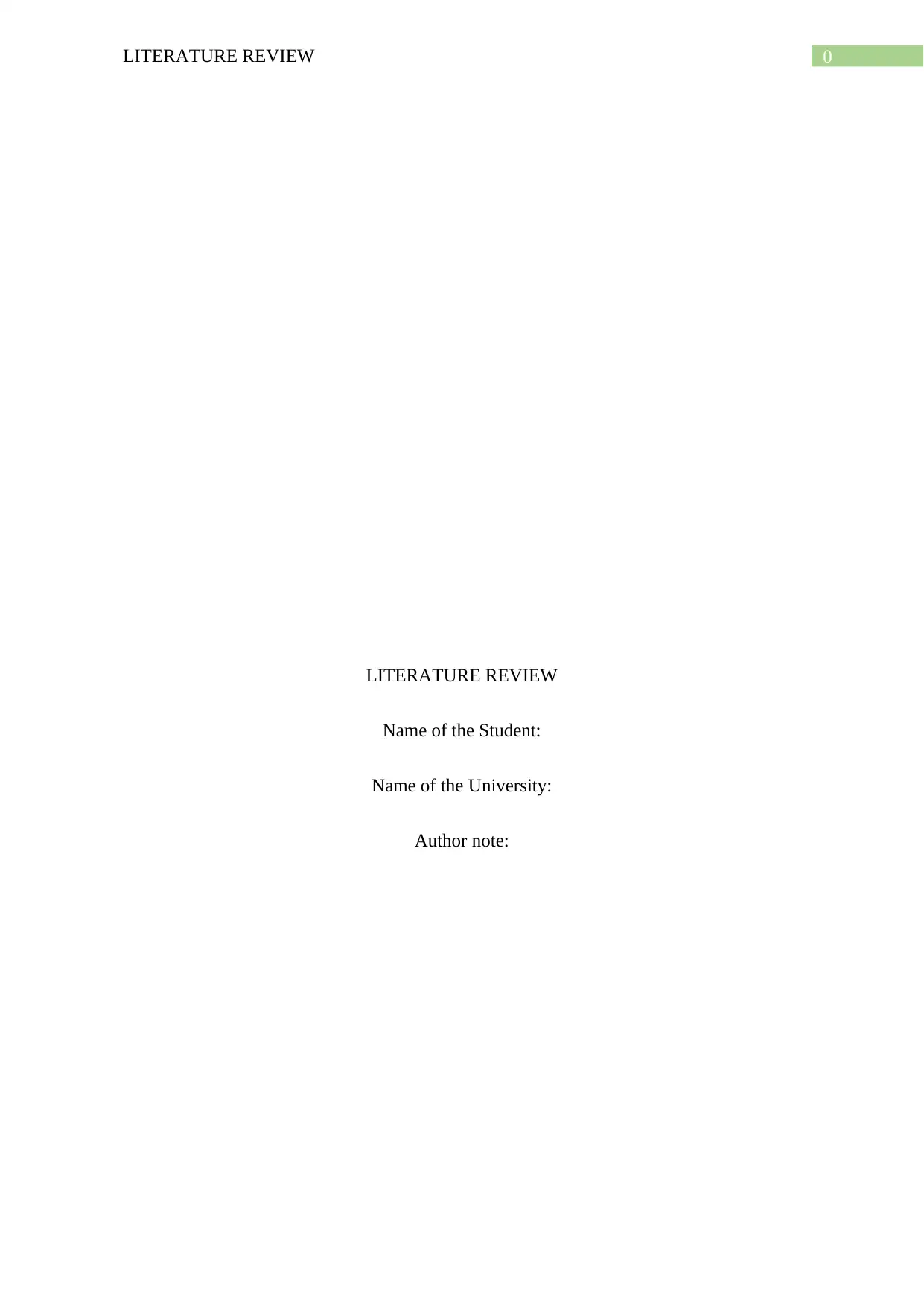
0LITERATURE REVIEW
LITERATURE REVIEW
Name of the Student:
Name of the University:
Author note:
LITERATURE REVIEW
Name of the Student:
Name of the University:
Author note:
Secure Best Marks with AI Grader
Need help grading? Try our AI Grader for instant feedback on your assignments.
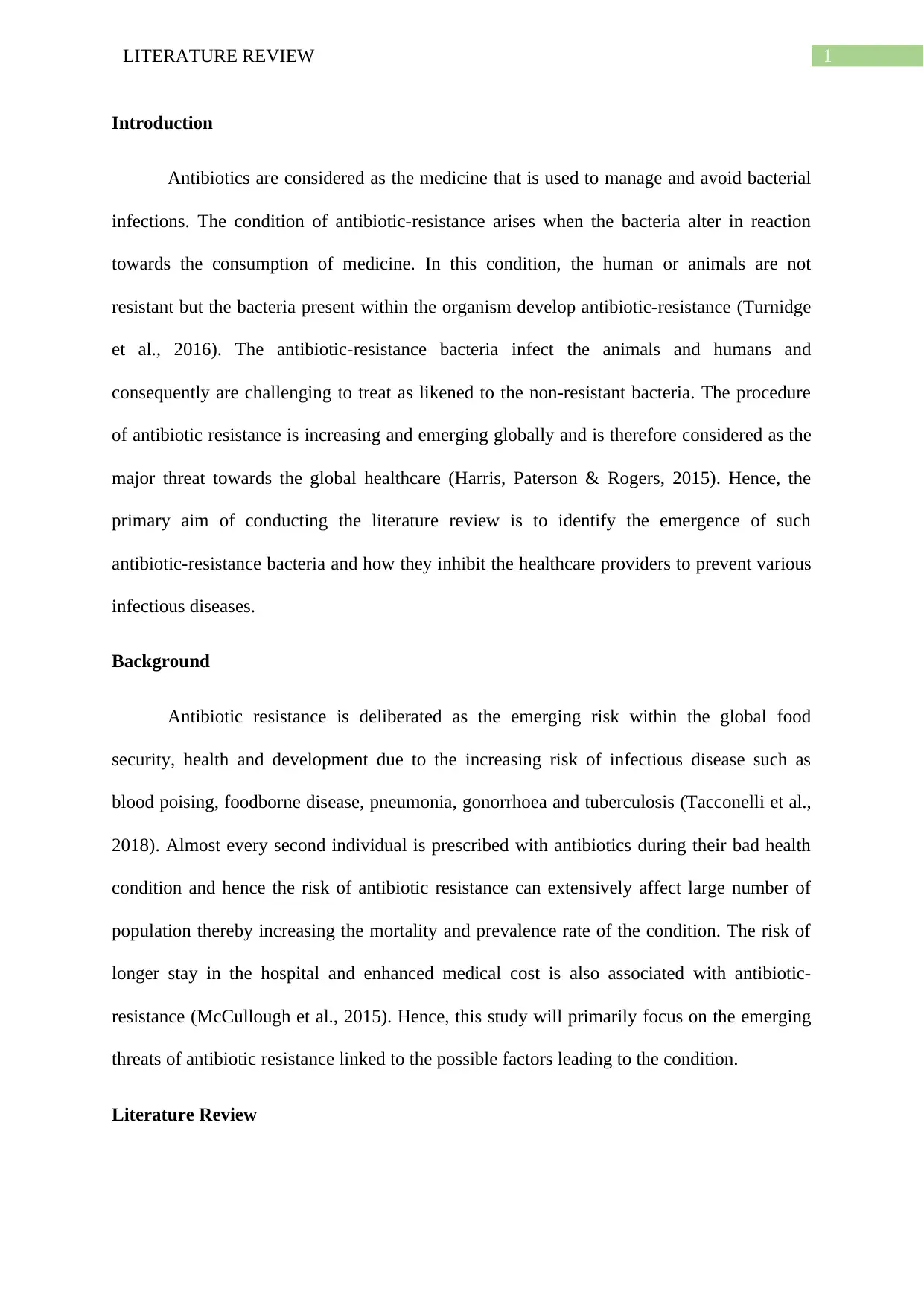
1LITERATURE REVIEW
Introduction
Antibiotics are considered as the medicine that is used to manage and avoid bacterial
infections. The condition of antibiotic-resistance arises when the bacteria alter in reaction
towards the consumption of medicine. In this condition, the human or animals are not
resistant but the bacteria present within the organism develop antibiotic-resistance (Turnidge
et al., 2016). The antibiotic-resistance bacteria infect the animals and humans and
consequently are challenging to treat as likened to the non-resistant bacteria. The procedure
of antibiotic resistance is increasing and emerging globally and is therefore considered as the
major threat towards the global healthcare (Harris, Paterson & Rogers, 2015). Hence, the
primary aim of conducting the literature review is to identify the emergence of such
antibiotic-resistance bacteria and how they inhibit the healthcare providers to prevent various
infectious diseases.
Background
Antibiotic resistance is deliberated as the emerging risk within the global food
security, health and development due to the increasing risk of infectious disease such as
blood poising, foodborne disease, pneumonia, gonorrhoea and tuberculosis (Tacconelli et al.,
2018). Almost every second individual is prescribed with antibiotics during their bad health
condition and hence the risk of antibiotic resistance can extensively affect large number of
population thereby increasing the mortality and prevalence rate of the condition. The risk of
longer stay in the hospital and enhanced medical cost is also associated with antibiotic-
resistance (McCullough et al., 2015). Hence, this study will primarily focus on the emerging
threats of antibiotic resistance linked to the possible factors leading to the condition.
Literature Review
Introduction
Antibiotics are considered as the medicine that is used to manage and avoid bacterial
infections. The condition of antibiotic-resistance arises when the bacteria alter in reaction
towards the consumption of medicine. In this condition, the human or animals are not
resistant but the bacteria present within the organism develop antibiotic-resistance (Turnidge
et al., 2016). The antibiotic-resistance bacteria infect the animals and humans and
consequently are challenging to treat as likened to the non-resistant bacteria. The procedure
of antibiotic resistance is increasing and emerging globally and is therefore considered as the
major threat towards the global healthcare (Harris, Paterson & Rogers, 2015). Hence, the
primary aim of conducting the literature review is to identify the emergence of such
antibiotic-resistance bacteria and how they inhibit the healthcare providers to prevent various
infectious diseases.
Background
Antibiotic resistance is deliberated as the emerging risk within the global food
security, health and development due to the increasing risk of infectious disease such as
blood poising, foodborne disease, pneumonia, gonorrhoea and tuberculosis (Tacconelli et al.,
2018). Almost every second individual is prescribed with antibiotics during their bad health
condition and hence the risk of antibiotic resistance can extensively affect large number of
population thereby increasing the mortality and prevalence rate of the condition. The risk of
longer stay in the hospital and enhanced medical cost is also associated with antibiotic-
resistance (McCullough et al., 2015). Hence, this study will primarily focus on the emerging
threats of antibiotic resistance linked to the possible factors leading to the condition.
Literature Review
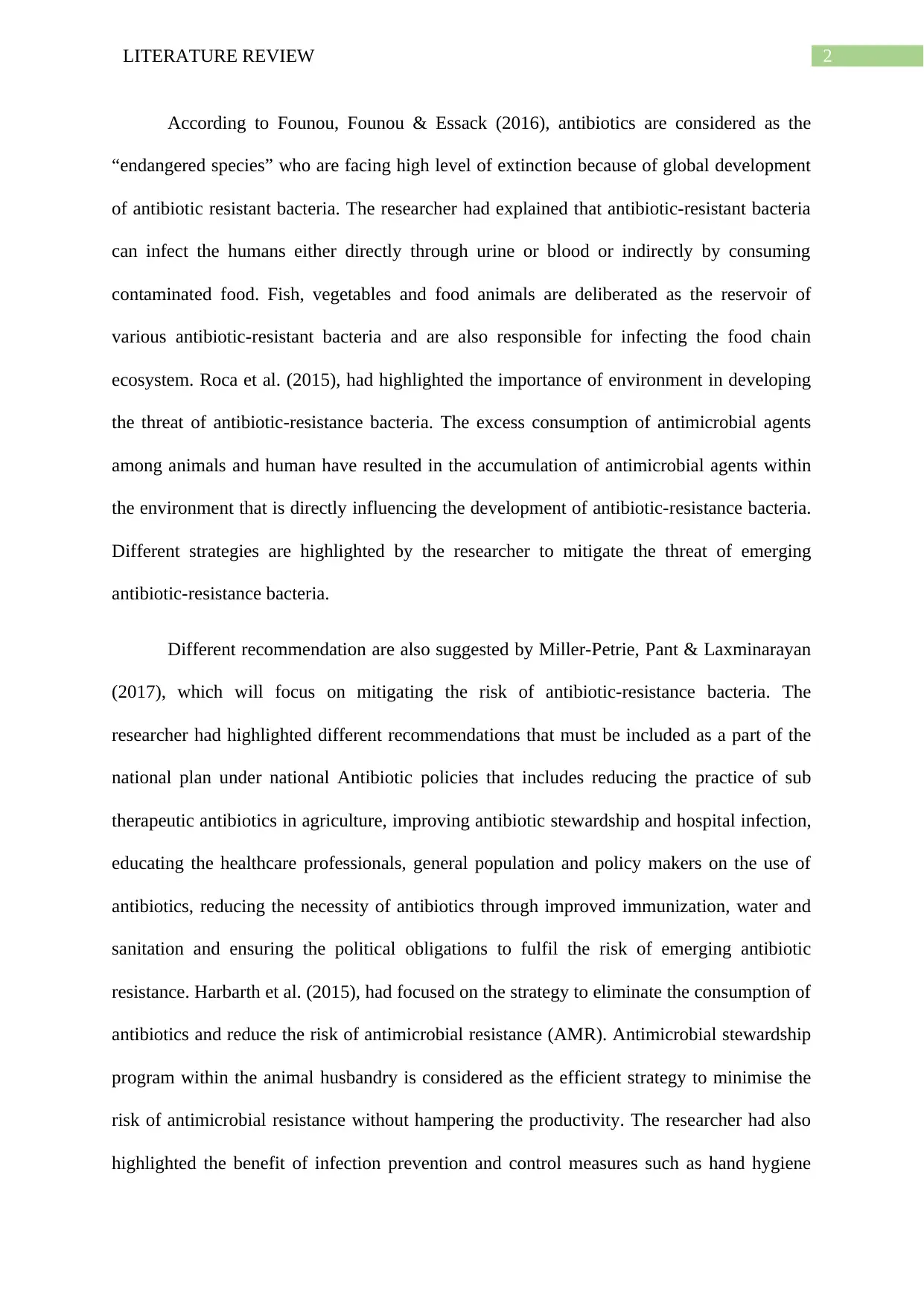
2LITERATURE REVIEW
According to Founou, Founou & Essack (2016), antibiotics are considered as the
“endangered species” who are facing high level of extinction because of global development
of antibiotic resistant bacteria. The researcher had explained that antibiotic-resistant bacteria
can infect the humans either directly through urine or blood or indirectly by consuming
contaminated food. Fish, vegetables and food animals are deliberated as the reservoir of
various antibiotic-resistant bacteria and are also responsible for infecting the food chain
ecosystem. Roca et al. (2015), had highlighted the importance of environment in developing
the threat of antibiotic-resistance bacteria. The excess consumption of antimicrobial agents
among animals and human have resulted in the accumulation of antimicrobial agents within
the environment that is directly influencing the development of antibiotic-resistance bacteria.
Different strategies are highlighted by the researcher to mitigate the threat of emerging
antibiotic-resistance bacteria.
Different recommendation are also suggested by Miller-Petrie, Pant & Laxminarayan
(2017), which will focus on mitigating the risk of antibiotic-resistance bacteria. The
researcher had highlighted different recommendations that must be included as a part of the
national plan under national Antibiotic policies that includes reducing the practice of sub
therapeutic antibiotics in agriculture, improving antibiotic stewardship and hospital infection,
educating the healthcare professionals, general population and policy makers on the use of
antibiotics, reducing the necessity of antibiotics through improved immunization, water and
sanitation and ensuring the political obligations to fulfil the risk of emerging antibiotic
resistance. Harbarth et al. (2015), had focused on the strategy to eliminate the consumption of
antibiotics and reduce the risk of antimicrobial resistance (AMR). Antimicrobial stewardship
program within the animal husbandry is considered as the efficient strategy to minimise the
risk of antimicrobial resistance without hampering the productivity. The researcher had also
highlighted the benefit of infection prevention and control measures such as hand hygiene
According to Founou, Founou & Essack (2016), antibiotics are considered as the
“endangered species” who are facing high level of extinction because of global development
of antibiotic resistant bacteria. The researcher had explained that antibiotic-resistant bacteria
can infect the humans either directly through urine or blood or indirectly by consuming
contaminated food. Fish, vegetables and food animals are deliberated as the reservoir of
various antibiotic-resistant bacteria and are also responsible for infecting the food chain
ecosystem. Roca et al. (2015), had highlighted the importance of environment in developing
the threat of antibiotic-resistance bacteria. The excess consumption of antimicrobial agents
among animals and human have resulted in the accumulation of antimicrobial agents within
the environment that is directly influencing the development of antibiotic-resistance bacteria.
Different strategies are highlighted by the researcher to mitigate the threat of emerging
antibiotic-resistance bacteria.
Different recommendation are also suggested by Miller-Petrie, Pant & Laxminarayan
(2017), which will focus on mitigating the risk of antibiotic-resistance bacteria. The
researcher had highlighted different recommendations that must be included as a part of the
national plan under national Antibiotic policies that includes reducing the practice of sub
therapeutic antibiotics in agriculture, improving antibiotic stewardship and hospital infection,
educating the healthcare professionals, general population and policy makers on the use of
antibiotics, reducing the necessity of antibiotics through improved immunization, water and
sanitation and ensuring the political obligations to fulfil the risk of emerging antibiotic
resistance. Harbarth et al. (2015), had focused on the strategy to eliminate the consumption of
antibiotics and reduce the risk of antimicrobial resistance (AMR). Antimicrobial stewardship
program within the animal husbandry is considered as the efficient strategy to minimise the
risk of antimicrobial resistance without hampering the productivity. The researcher had also
highlighted the benefit of infection prevention and control measures such as hand hygiene
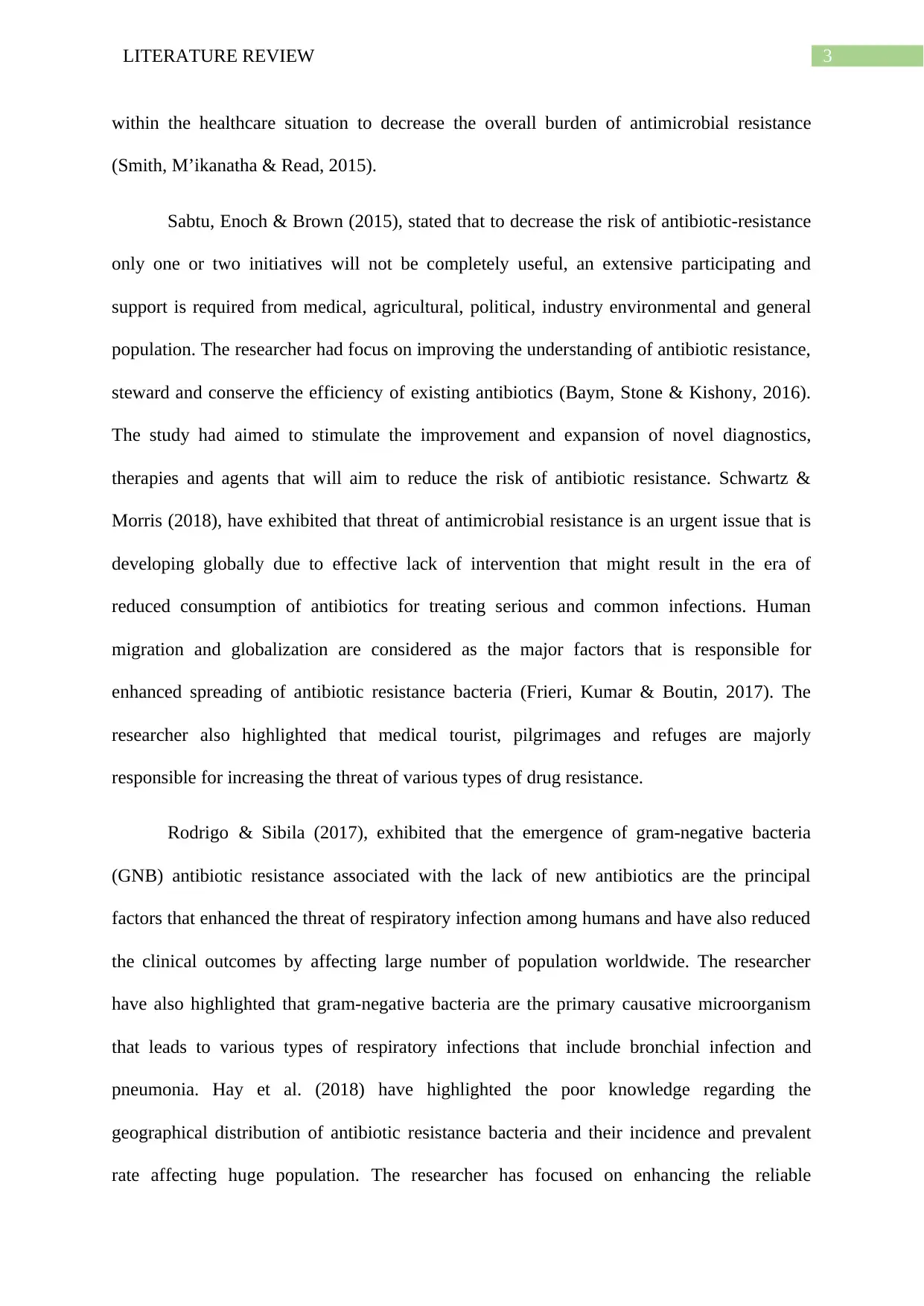
3LITERATURE REVIEW
within the healthcare situation to decrease the overall burden of antimicrobial resistance
(Smith, M’ikanatha & Read, 2015).
Sabtu, Enoch & Brown (2015), stated that to decrease the risk of antibiotic-resistance
only one or two initiatives will not be completely useful, an extensive participating and
support is required from medical, agricultural, political, industry environmental and general
population. The researcher had focus on improving the understanding of antibiotic resistance,
steward and conserve the efficiency of existing antibiotics (Baym, Stone & Kishony, 2016).
The study had aimed to stimulate the improvement and expansion of novel diagnostics,
therapies and agents that will aim to reduce the risk of antibiotic resistance. Schwartz &
Morris (2018), have exhibited that threat of antimicrobial resistance is an urgent issue that is
developing globally due to effective lack of intervention that might result in the era of
reduced consumption of antibiotics for treating serious and common infections. Human
migration and globalization are considered as the major factors that is responsible for
enhanced spreading of antibiotic resistance bacteria (Frieri, Kumar & Boutin, 2017). The
researcher also highlighted that medical tourist, pilgrimages and refuges are majorly
responsible for increasing the threat of various types of drug resistance.
Rodrigo & Sibila (2017), exhibited that the emergence of gram-negative bacteria
(GNB) antibiotic resistance associated with the lack of new antibiotics are the principal
factors that enhanced the threat of respiratory infection among humans and have also reduced
the clinical outcomes by affecting large number of population worldwide. The researcher
have also highlighted that gram-negative bacteria are the primary causative microorganism
that leads to various types of respiratory infections that include bronchial infection and
pneumonia. Hay et al. (2018) have highlighted the poor knowledge regarding the
geographical distribution of antibiotic resistance bacteria and their incidence and prevalent
rate affecting huge population. The researcher has focused on enhancing the reliable
within the healthcare situation to decrease the overall burden of antimicrobial resistance
(Smith, M’ikanatha & Read, 2015).
Sabtu, Enoch & Brown (2015), stated that to decrease the risk of antibiotic-resistance
only one or two initiatives will not be completely useful, an extensive participating and
support is required from medical, agricultural, political, industry environmental and general
population. The researcher had focus on improving the understanding of antibiotic resistance,
steward and conserve the efficiency of existing antibiotics (Baym, Stone & Kishony, 2016).
The study had aimed to stimulate the improvement and expansion of novel diagnostics,
therapies and agents that will aim to reduce the risk of antibiotic resistance. Schwartz &
Morris (2018), have exhibited that threat of antimicrobial resistance is an urgent issue that is
developing globally due to effective lack of intervention that might result in the era of
reduced consumption of antibiotics for treating serious and common infections. Human
migration and globalization are considered as the major factors that is responsible for
enhanced spreading of antibiotic resistance bacteria (Frieri, Kumar & Boutin, 2017). The
researcher also highlighted that medical tourist, pilgrimages and refuges are majorly
responsible for increasing the threat of various types of drug resistance.
Rodrigo & Sibila (2017), exhibited that the emergence of gram-negative bacteria
(GNB) antibiotic resistance associated with the lack of new antibiotics are the principal
factors that enhanced the threat of respiratory infection among humans and have also reduced
the clinical outcomes by affecting large number of population worldwide. The researcher
have also highlighted that gram-negative bacteria are the primary causative microorganism
that leads to various types of respiratory infections that include bronchial infection and
pneumonia. Hay et al. (2018) have highlighted the poor knowledge regarding the
geographical distribution of antibiotic resistance bacteria and their incidence and prevalent
rate affecting huge population. The researcher has focused on enhancing the reliable
Secure Best Marks with AI Grader
Need help grading? Try our AI Grader for instant feedback on your assignments.
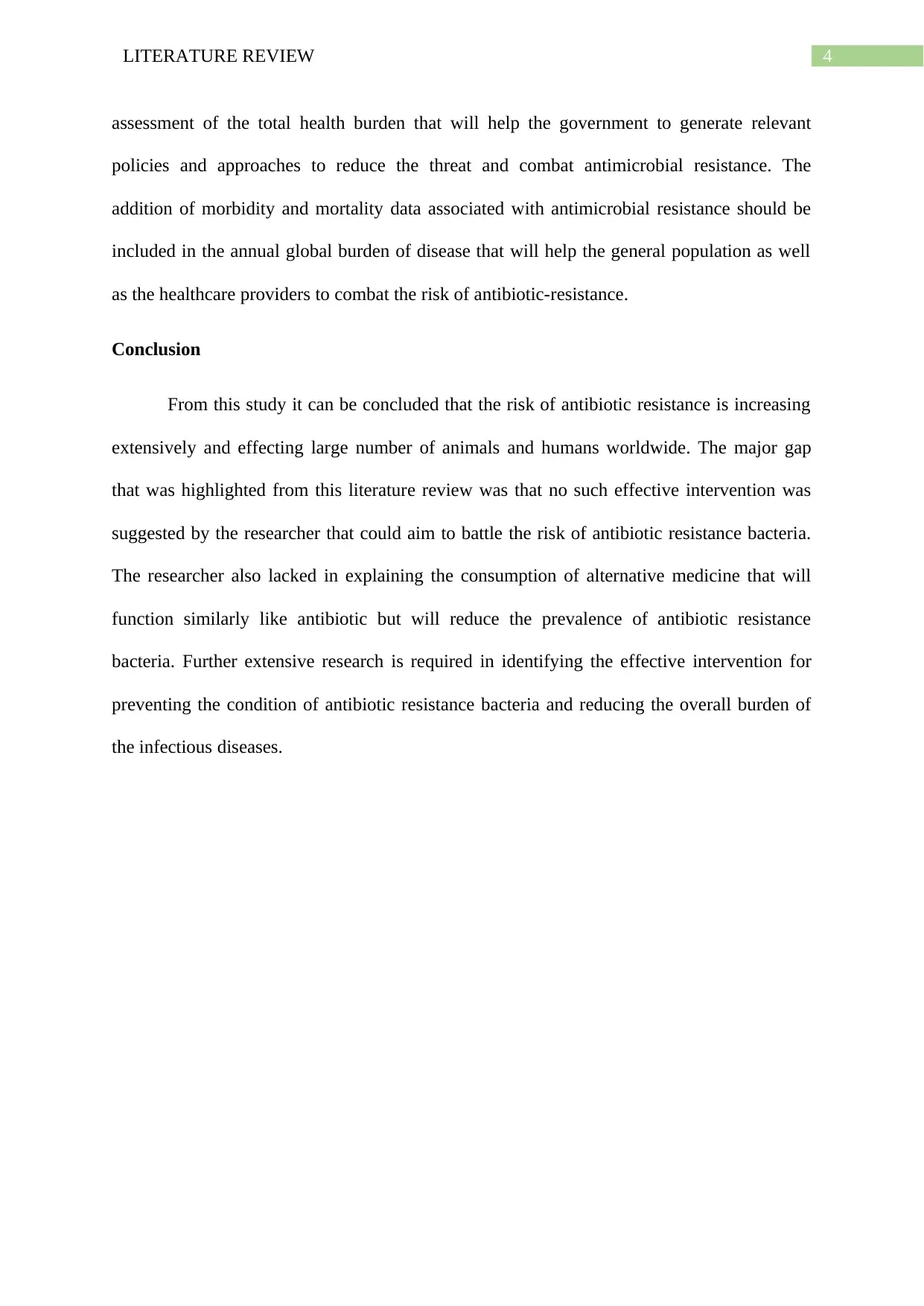
4LITERATURE REVIEW
assessment of the total health burden that will help the government to generate relevant
policies and approaches to reduce the threat and combat antimicrobial resistance. The
addition of morbidity and mortality data associated with antimicrobial resistance should be
included in the annual global burden of disease that will help the general population as well
as the healthcare providers to combat the risk of antibiotic-resistance.
Conclusion
From this study it can be concluded that the risk of antibiotic resistance is increasing
extensively and effecting large number of animals and humans worldwide. The major gap
that was highlighted from this literature review was that no such effective intervention was
suggested by the researcher that could aim to battle the risk of antibiotic resistance bacteria.
The researcher also lacked in explaining the consumption of alternative medicine that will
function similarly like antibiotic but will reduce the prevalence of antibiotic resistance
bacteria. Further extensive research is required in identifying the effective intervention for
preventing the condition of antibiotic resistance bacteria and reducing the overall burden of
the infectious diseases.
assessment of the total health burden that will help the government to generate relevant
policies and approaches to reduce the threat and combat antimicrobial resistance. The
addition of morbidity and mortality data associated with antimicrobial resistance should be
included in the annual global burden of disease that will help the general population as well
as the healthcare providers to combat the risk of antibiotic-resistance.
Conclusion
From this study it can be concluded that the risk of antibiotic resistance is increasing
extensively and effecting large number of animals and humans worldwide. The major gap
that was highlighted from this literature review was that no such effective intervention was
suggested by the researcher that could aim to battle the risk of antibiotic resistance bacteria.
The researcher also lacked in explaining the consumption of alternative medicine that will
function similarly like antibiotic but will reduce the prevalence of antibiotic resistance
bacteria. Further extensive research is required in identifying the effective intervention for
preventing the condition of antibiotic resistance bacteria and reducing the overall burden of
the infectious diseases.
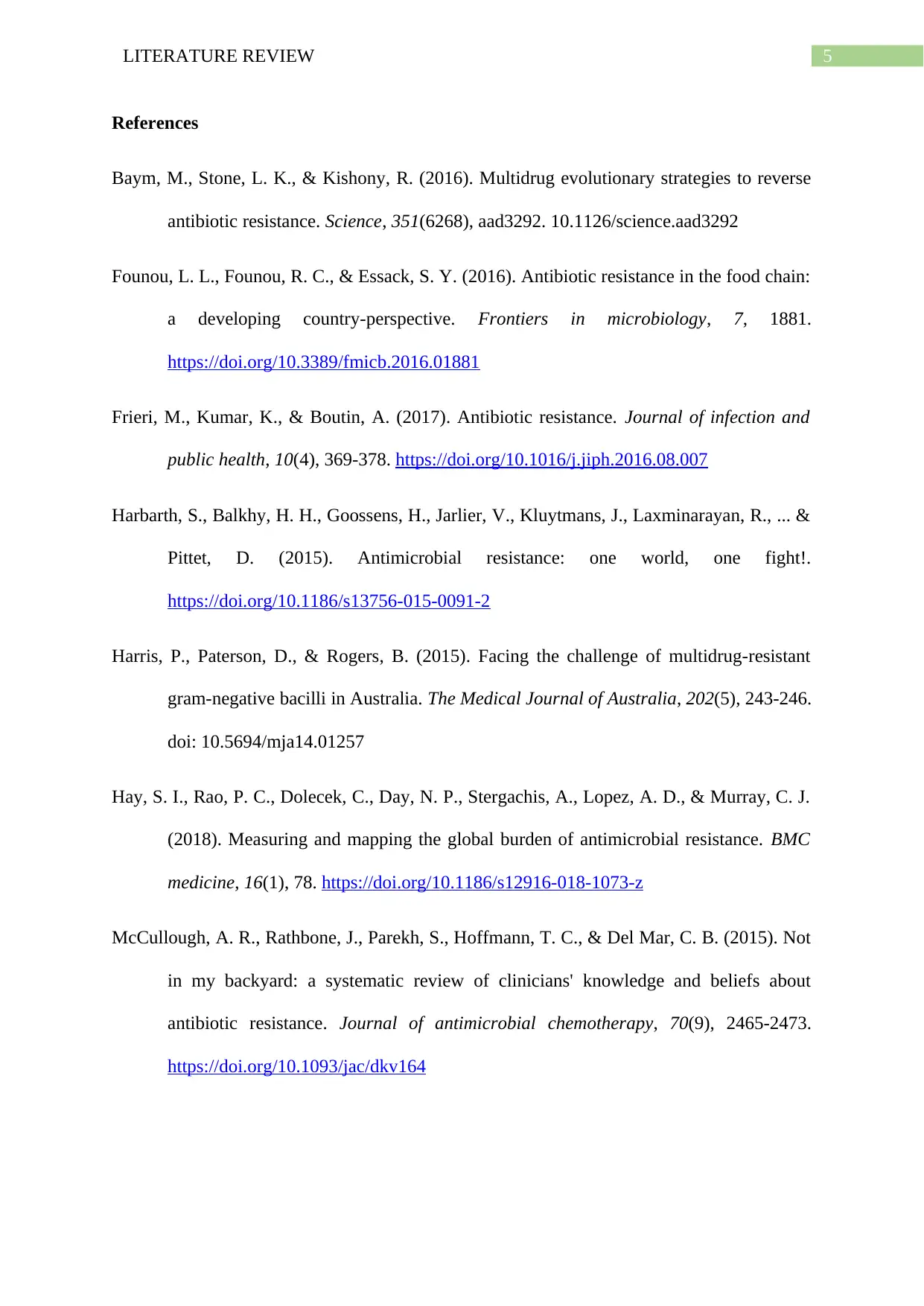
5LITERATURE REVIEW
References
Baym, M., Stone, L. K., & Kishony, R. (2016). Multidrug evolutionary strategies to reverse
antibiotic resistance. Science, 351(6268), aad3292. 10.1126/science.aad3292
Founou, L. L., Founou, R. C., & Essack, S. Y. (2016). Antibiotic resistance in the food chain:
a developing country-perspective. Frontiers in microbiology, 7, 1881.
https://doi.org/10.3389/fmicb.2016.01881
Frieri, M., Kumar, K., & Boutin, A. (2017). Antibiotic resistance. Journal of infection and
public health, 10(4), 369-378. https://doi.org/10.1016/j.jiph.2016.08.007
Harbarth, S., Balkhy, H. H., Goossens, H., Jarlier, V., Kluytmans, J., Laxminarayan, R., ... &
Pittet, D. (2015). Antimicrobial resistance: one world, one fight!.
https://doi.org/10.1186/s13756-015-0091-2
Harris, P., Paterson, D., & Rogers, B. (2015). Facing the challenge of multidrug-resistant
gram-negative bacilli in Australia. The Medical Journal of Australia, 202(5), 243-246.
doi: 10.5694/mja14.01257
Hay, S. I., Rao, P. C., Dolecek, C., Day, N. P., Stergachis, A., Lopez, A. D., & Murray, C. J.
(2018). Measuring and mapping the global burden of antimicrobial resistance. BMC
medicine, 16(1), 78. https://doi.org/10.1186/s12916-018-1073-z
McCullough, A. R., Rathbone, J., Parekh, S., Hoffmann, T. C., & Del Mar, C. B. (2015). Not
in my backyard: a systematic review of clinicians' knowledge and beliefs about
antibiotic resistance. Journal of antimicrobial chemotherapy, 70(9), 2465-2473.
https://doi.org/10.1093/jac/dkv164
References
Baym, M., Stone, L. K., & Kishony, R. (2016). Multidrug evolutionary strategies to reverse
antibiotic resistance. Science, 351(6268), aad3292. 10.1126/science.aad3292
Founou, L. L., Founou, R. C., & Essack, S. Y. (2016). Antibiotic resistance in the food chain:
a developing country-perspective. Frontiers in microbiology, 7, 1881.
https://doi.org/10.3389/fmicb.2016.01881
Frieri, M., Kumar, K., & Boutin, A. (2017). Antibiotic resistance. Journal of infection and
public health, 10(4), 369-378. https://doi.org/10.1016/j.jiph.2016.08.007
Harbarth, S., Balkhy, H. H., Goossens, H., Jarlier, V., Kluytmans, J., Laxminarayan, R., ... &
Pittet, D. (2015). Antimicrobial resistance: one world, one fight!.
https://doi.org/10.1186/s13756-015-0091-2
Harris, P., Paterson, D., & Rogers, B. (2015). Facing the challenge of multidrug-resistant
gram-negative bacilli in Australia. The Medical Journal of Australia, 202(5), 243-246.
doi: 10.5694/mja14.01257
Hay, S. I., Rao, P. C., Dolecek, C., Day, N. P., Stergachis, A., Lopez, A. D., & Murray, C. J.
(2018). Measuring and mapping the global burden of antimicrobial resistance. BMC
medicine, 16(1), 78. https://doi.org/10.1186/s12916-018-1073-z
McCullough, A. R., Rathbone, J., Parekh, S., Hoffmann, T. C., & Del Mar, C. B. (2015). Not
in my backyard: a systematic review of clinicians' knowledge and beliefs about
antibiotic resistance. Journal of antimicrobial chemotherapy, 70(9), 2465-2473.
https://doi.org/10.1093/jac/dkv164
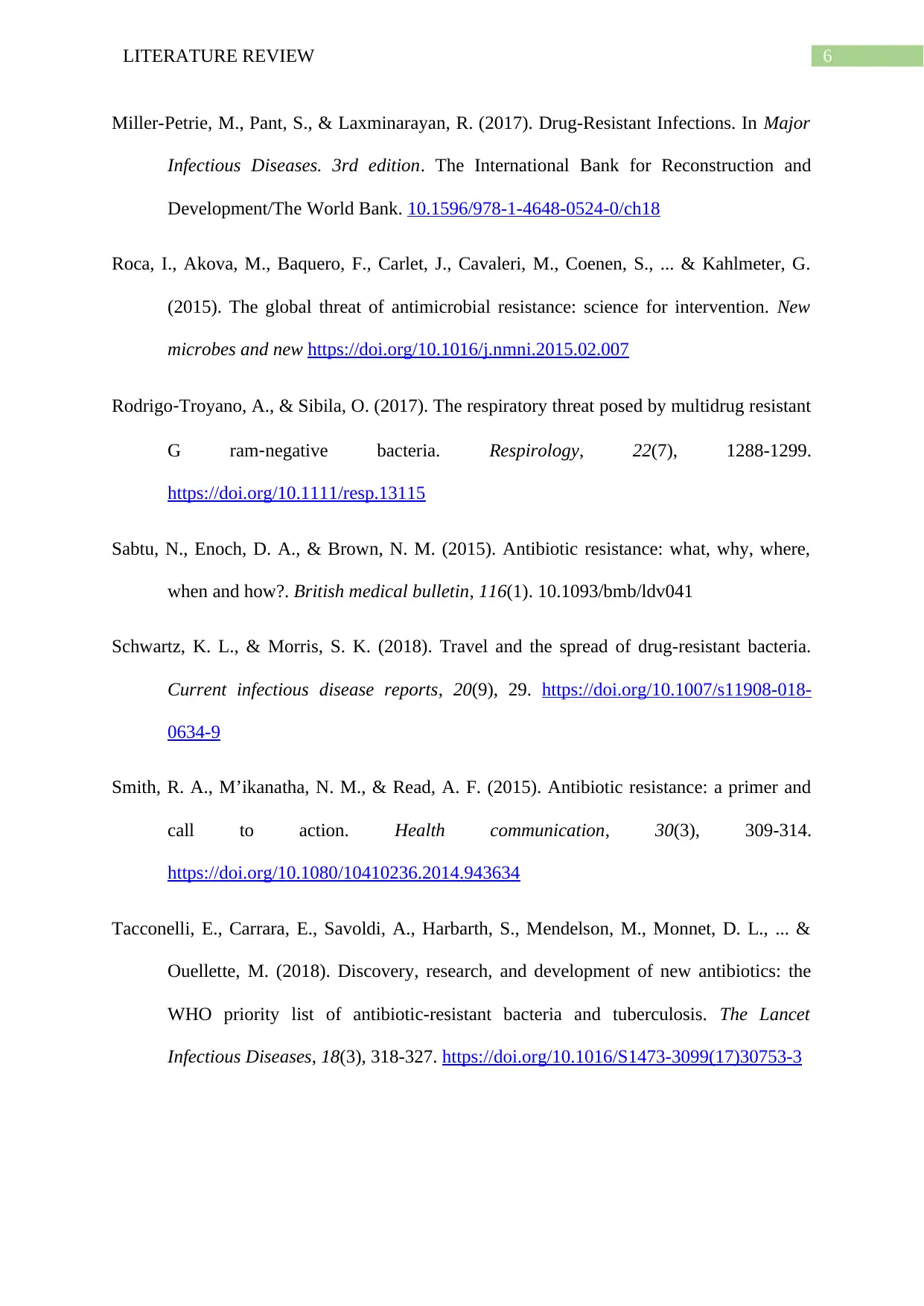
6LITERATURE REVIEW
Miller-Petrie, M., Pant, S., & Laxminarayan, R. (2017). Drug-Resistant Infections. In Major
Infectious Diseases. 3rd edition. The International Bank for Reconstruction and
Development/The World Bank. 10.1596/978-1-4648-0524-0/ch18
Roca, I., Akova, M., Baquero, F., Carlet, J., Cavaleri, M., Coenen, S., ... & Kahlmeter, G.
(2015). The global threat of antimicrobial resistance: science for intervention. New
microbes and new https://doi.org/10.1016/j.nmni.2015.02.007
Rodrigo‐Troyano, A., & Sibila, O. (2017). The respiratory threat posed by multidrug resistant
G ram‐negative bacteria. Respirology, 22(7), 1288-1299.
https://doi.org/10.1111/resp.13115
Sabtu, N., Enoch, D. A., & Brown, N. M. (2015). Antibiotic resistance: what, why, where,
when and how?. British medical bulletin, 116(1). 10.1093/bmb/ldv041
Schwartz, K. L., & Morris, S. K. (2018). Travel and the spread of drug-resistant bacteria.
Current infectious disease reports, 20(9), 29. https://doi.org/10.1007/s11908-018-
0634-9
Smith, R. A., M’ikanatha, N. M., & Read, A. F. (2015). Antibiotic resistance: a primer and
call to action. Health communication, 30(3), 309-314.
https://doi.org/10.1080/10410236.2014.943634
Tacconelli, E., Carrara, E., Savoldi, A., Harbarth, S., Mendelson, M., Monnet, D. L., ... &
Ouellette, M. (2018). Discovery, research, and development of new antibiotics: the
WHO priority list of antibiotic-resistant bacteria and tuberculosis. The Lancet
Infectious Diseases, 18(3), 318-327. https://doi.org/10.1016/S1473-3099(17)30753-3
Miller-Petrie, M., Pant, S., & Laxminarayan, R. (2017). Drug-Resistant Infections. In Major
Infectious Diseases. 3rd edition. The International Bank for Reconstruction and
Development/The World Bank. 10.1596/978-1-4648-0524-0/ch18
Roca, I., Akova, M., Baquero, F., Carlet, J., Cavaleri, M., Coenen, S., ... & Kahlmeter, G.
(2015). The global threat of antimicrobial resistance: science for intervention. New
microbes and new https://doi.org/10.1016/j.nmni.2015.02.007
Rodrigo‐Troyano, A., & Sibila, O. (2017). The respiratory threat posed by multidrug resistant
G ram‐negative bacteria. Respirology, 22(7), 1288-1299.
https://doi.org/10.1111/resp.13115
Sabtu, N., Enoch, D. A., & Brown, N. M. (2015). Antibiotic resistance: what, why, where,
when and how?. British medical bulletin, 116(1). 10.1093/bmb/ldv041
Schwartz, K. L., & Morris, S. K. (2018). Travel and the spread of drug-resistant bacteria.
Current infectious disease reports, 20(9), 29. https://doi.org/10.1007/s11908-018-
0634-9
Smith, R. A., M’ikanatha, N. M., & Read, A. F. (2015). Antibiotic resistance: a primer and
call to action. Health communication, 30(3), 309-314.
https://doi.org/10.1080/10410236.2014.943634
Tacconelli, E., Carrara, E., Savoldi, A., Harbarth, S., Mendelson, M., Monnet, D. L., ... &
Ouellette, M. (2018). Discovery, research, and development of new antibiotics: the
WHO priority list of antibiotic-resistant bacteria and tuberculosis. The Lancet
Infectious Diseases, 18(3), 318-327. https://doi.org/10.1016/S1473-3099(17)30753-3
Paraphrase This Document
Need a fresh take? Get an instant paraphrase of this document with our AI Paraphraser
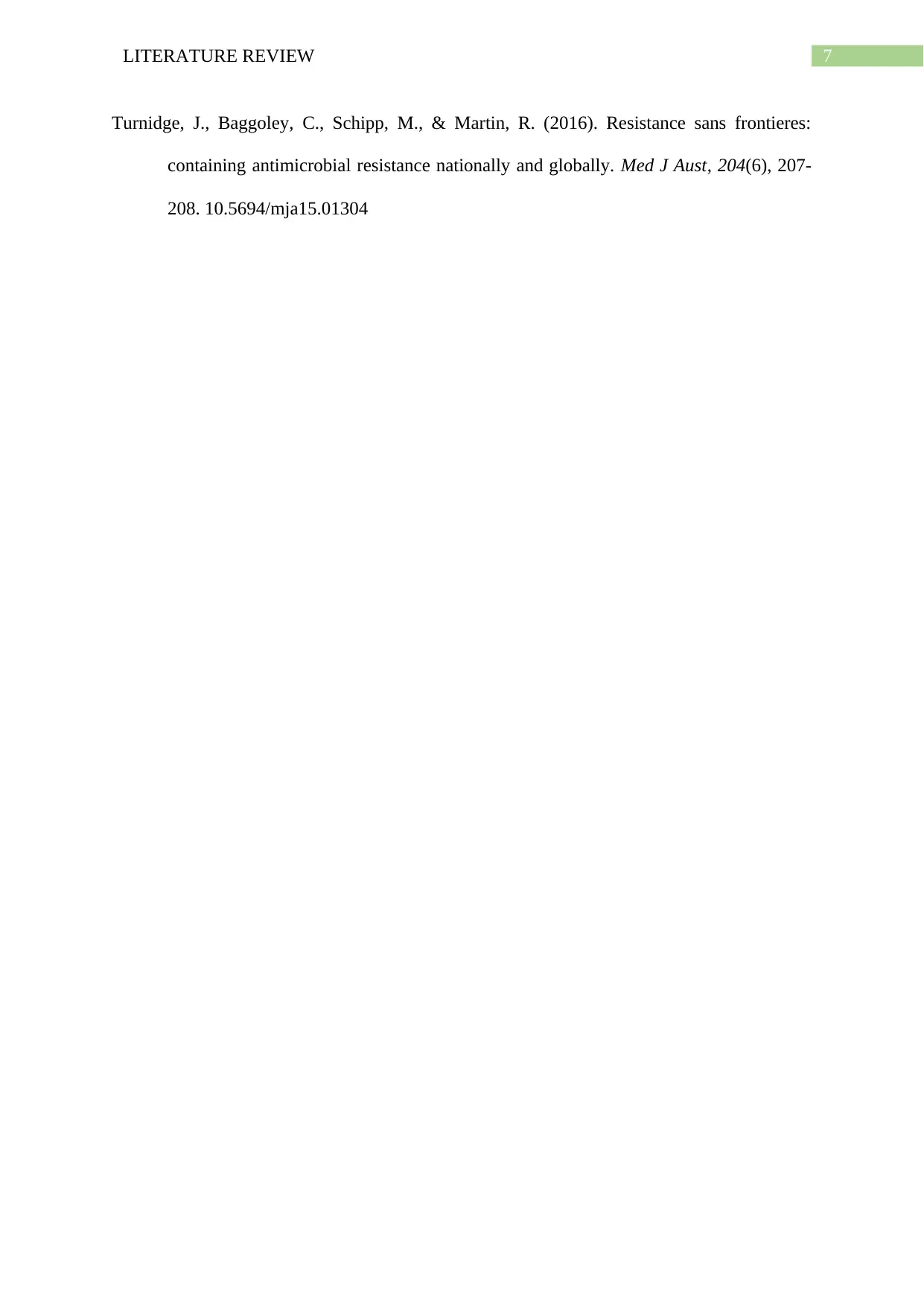
7LITERATURE REVIEW
Turnidge, J., Baggoley, C., Schipp, M., & Martin, R. (2016). Resistance sans frontieres:
containing antimicrobial resistance nationally and globally. Med J Aust, 204(6), 207-
208. 10.5694/mja15.01304
Turnidge, J., Baggoley, C., Schipp, M., & Martin, R. (2016). Resistance sans frontieres:
containing antimicrobial resistance nationally and globally. Med J Aust, 204(6), 207-
208. 10.5694/mja15.01304
1 out of 8
Related Documents
Your All-in-One AI-Powered Toolkit for Academic Success.
+13062052269
info@desklib.com
Available 24*7 on WhatsApp / Email
![[object Object]](/_next/static/media/star-bottom.7253800d.svg)
Unlock your academic potential
© 2024 | Zucol Services PVT LTD | All rights reserved.




